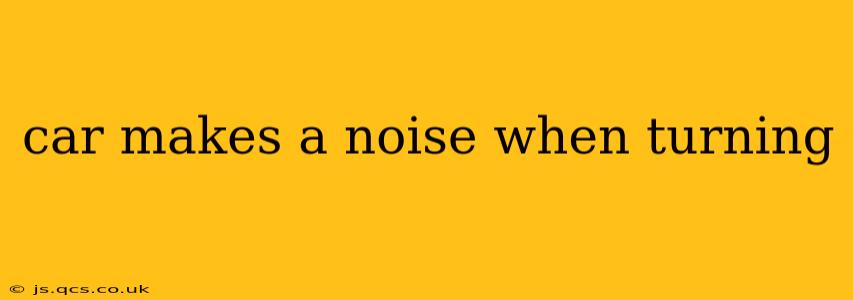Hearing a noise when turning your car can be unsettling. It's a sign that something might not be right, and ignoring it could lead to more serious (and expensive) problems down the road. This comprehensive guide will help you understand the potential causes of noises when turning and guide you towards a solution. Remember, this information is for guidance only, and professional diagnosis is always recommended.
What are the common noises a car makes when turning?
This is a crucial starting point. The type of noise – grinding, clicking, whining, popping, etc. – significantly narrows down the potential causes. Describing the noise accurately is vital for effective troubleshooting. Is it a constant noise or intermittent? Does it change with the speed of the turn? All these details matter.
Why does my car make a noise when turning left?
A noise specifically when turning left might indicate issues with components on that side of the vehicle. This could include:
- Left-side wheel bearing: A worn or damaged wheel bearing will often create a grinding or humming noise, particularly under stress like turning. The noise is usually more pronounced at low speeds and during turns.
- CV joint (Constant Velocity joint): Located in the drive axles, a failing CV joint often makes a clicking or popping sound, especially when turning, particularly at low speeds. This is because the joint is under more stress during turns.
- Power steering pump or fluid: Low power steering fluid or a failing power steering pump can cause whining, groaning, or squealing noises, often more noticeable when turning the steering wheel.
Why does my car make a noise when turning right?
Similar to left turns, noises when turning right often point to issues on the right side of the car. The same components listed above (wheel bearing, CV joint, power steering) can also be the culprits on this side. Don't assume it's the same problem as a left-turn noise; each side needs separate investigation.
Why does my car make a noise when turning at low speeds?
Low-speed turning often exacerbates issues with components experiencing higher stress during articulation, such as:
- Suspension components: Worn bushings, ball joints, or tie rod ends can create creaking, popping, or clunking sounds when turning at low speeds. These sounds are often linked to the movement of the suspension system under load.
- Steering components: Problems within the steering system itself, such as worn steering rack components, can also produce noises primarily noticeable at low speeds when turning.
Why does my car make a noise when turning at high speeds?
High-speed turns put more strain on various components. While some of the previously mentioned issues can manifest here, it's more likely to indicate a problem with:
- Wheel bearings (again): High-speed turns amplify the effects of a failing wheel bearing, making the noise far more prominent.
- Tires: Uneven tire wear or damaged tires can produce a humming or rumbling sound, particularly at higher speeds.
How much does it cost to fix a car that makes noise when turning?
The cost of repair depends entirely on the underlying cause. A simple issue like low power steering fluid is inexpensive to fix, while replacing a wheel bearing or CV joint is a more costly repair. It's impossible to give a definitive cost without a proper diagnosis by a mechanic.
When should I take my car to a mechanic for a noise when turning?
Don't delay! Any persistent noise when turning warrants a professional inspection. Ignoring the problem could lead to:
- Safety hazards: A failing wheel bearing, for example, can lead to a complete wheel seizure, resulting in a dangerous loss of control.
- Increased damage: Small issues can escalate into larger, more expensive problems if left untreated.
- Further damage to other components: A neglected issue in one area might damage adjacent parts.
Professional diagnosis provides peace of mind and prevents escalating problems. A mechanic can accurately pinpoint the source of the noise and recommend the appropriate repairs.
This guide provides a starting point for understanding the potential causes of noises when turning your car. Remember to accurately describe the sound, its frequency, and related factors to your mechanic for an accurate and efficient diagnosis. Safety is paramount – address the issue promptly.
